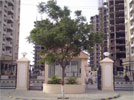
When asked to tender against a detailed specification for a fire detection installation based on conventional technology, Spectrum Security Solutions of Faridabad in India decided that a better solution was possible. Accordingly, the company put forward an alternative proposal for a project that included eight, thirteen-floor tower blocks.

Spectrum Security was successful in winning the contract by proposing a system based on fire detection products from Fike which offered greatly reduced complexity and installation costs.
The original specification for this major project had been drawn up on the belief that using conventional fire detection products, rather than addressable types, would help keep costs down - which proved not to be true. When Spectrum Security analysed the project requirements in detail, it found that 575 detectors were needed plus 600 call points and 120 sounders. With conventional equipment, eight control panels would also be necessary – one for each of the tower blocks – plus a central repeater panel in the site’s security control room. The total amount of cabling using this approach would have been in excess of 50 000 m.
Having worked extensively with Fike, Spectrum Security knew that their products could be used to implement a more effective, versatile and far more economical system. The company therefore put forward a solution that was a combination of addressable and conventional technologies. Though this was a major deviation from the original specification, it was readily accepted by the project managers because of its apparent technical and financial benefits.
The solution developed and implemented by Spectrum Security uses addressable detectors throughout, providing far greater flexibility than a conventional non-addressable system. Where necessary detectors with a built-in sounder were used, eliminating the cost of separate sounders and the time needed to fit and wire them. Perhaps even more beneficial for this project, Fike addressable detectors have integral facilities for the connection of digital input signals from external devices. This enabled Spectrum Security to connect up to five call points to each detector, eliminating the need for separate input/output modules and significantly reducing the amount of wiring associated with the call points.
Additional savings were realised through the use of the versatile Fike Quadnet control panels, which can support up to four loops per panel and up to 200 connected devices per loop. Spectrum Security found that the requirements of the whole site could be successfully addressed with a single Quadnet panel, instead of the eight conventional panels and central panel originally specified.
An important consequence of the Fike implementation was the reduction of the overall cabling requirement for the project to less than 15 000 m - a 70% reduction in cabling materials and the associated installation costs.
For further information contact Fike Safety Technology on http://www.fike.com

© Technews Publishing (Pty) Ltd. | All Rights Reserved.